CRM Solutions: Streamline Your Sales and Customer Management
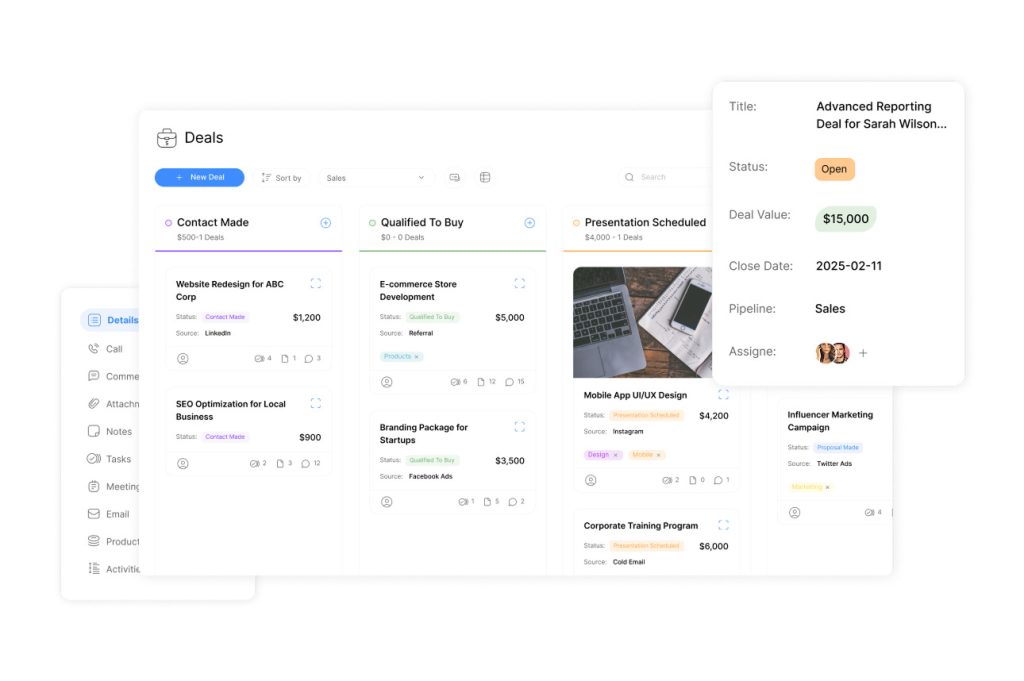
Are businesses leaving money on the table by inefficiently managing their customer interactions?
In today’s competitive landscape, companies need to streamline their sales and customer management processes to stay ahead. By leveraging customer relationship management tools, businesses can consolidate customer data from various sources into a unified platform, creating a single source of truth for all customer-related information. This centralized approach not only improves efficiency but also enhances the quality of customer interactions. By leveraging customer insights effectively, businesses can tailor their offerings to meet the specific needs and preferences of their clients. Ultimately, this leads to stronger relationships and increased customer loyalty, ensuring sustainable growth in an ever-evolving market.
This enables companies to track sales activities, enhance customer relationships, and drive revenue growth through data-driven decision making. Effective customer management is crucial for businesses to succeed, and ClearCRM solutions can help achieve this goal.
Key Takeaways
- CRM solutions help businesses manage customer interactions across multiple touchpoints and channels.
- Consolidating customer data into a unified platform creates a single source of truth.
- CRM tools enable companies to track sales activities and drive revenue growth.
- Effective customer management is crucial for business success.
- CRM solutions streamline operations and enhance customer relationships.
What is Customer Relationship Management (CRM)?
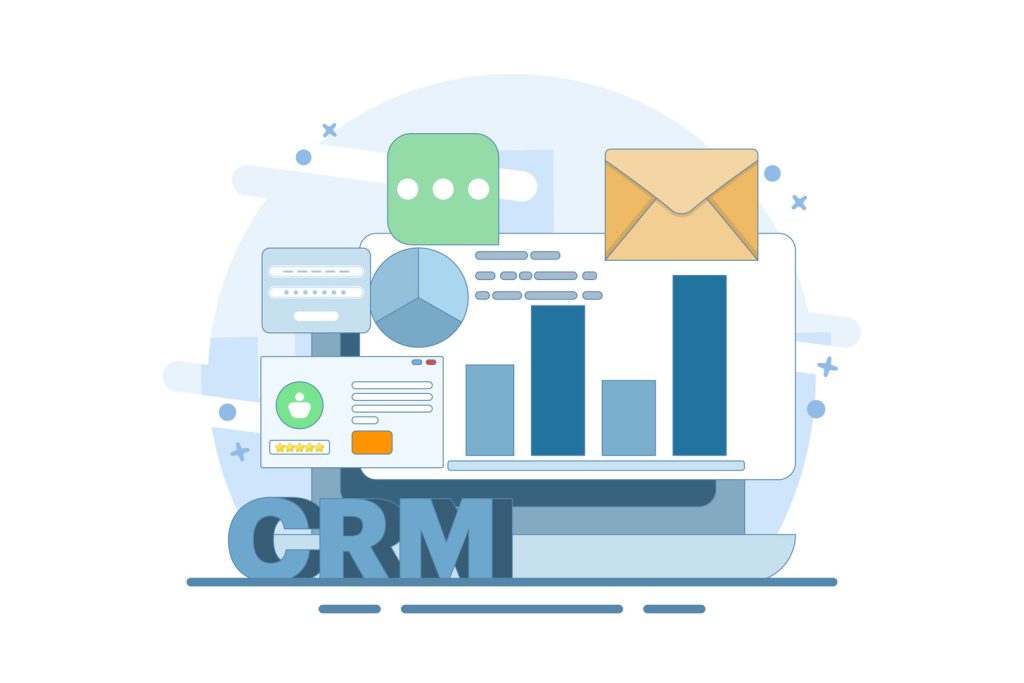
The concept of Customer Relationship Management (ClearCRM) has revolutionized how businesses interact with their customers. At its core, CRM is about managing customer interactions to improve business relationships.
Definition and Core Concepts
Customer Relationship Management refers to the practices, strategies, and technologies that companies use to manage and analyze customer interactions throughout the customer lifecycle. The primary goal of CRM is to improve customer service, retain customers, and drive sales growth. ClearCRM software enables businesses to store customer data, track interactions, and analyze customer behavior to personalize their recommendations and improve customer satisfaction.
A CRM system helps sales teams to track leads, evaluate performance, and streamline their sales processes. By having a comprehensive view of customer interactions, businesses can make informed decisions, enhance customer engagement, and ultimately drive revenue growth.
Evolution of CRM Systems
The journey of CRM systems began in the 1980s with basic database marketing, evolving from simple contact management software to today’s sophisticated cloud-based platforms. Early CRM solutions were primarily on-premises systems requiring significant IT infrastructure and maintenance, limiting their accessibility to larger enterprises with substantial resources.
- The advent of cloud computing in the early 2000s democratized CRM access, allowing businesses of all sizes to implement powerful customer management solutions without heavy upfront investments.
- Modern CRM systems have integrated artificial intelligence and machine learning capabilities, enabling predictive analytics, automated lead scoring, and intelligent customer insights.
- The evolution continues with mobile CRM applications, social media integration, and omnichannel capabilities that allow businesses to engage with customers wherever they are.
| CRM Evolution Stage | Key Features | Benefits |
|---|---|---|
| 1980s: Basic Database Marketing | Simple contact management | Initial customer data collection |
| Early 2000s: Cloud Computing | Cloud-based CRM, reduced IT costs | Increased accessibility, scalability |
| Present Day: AI and Machine Learning | Predictive analytics, automated lead scoring | Enhanced customer insights, personalized engagement |
As businesses continue to adopt and evolve their CRM strategies, the focus remains on leveraging customer data to drive business decisions and improve customer satisfaction. By understanding the evolution and capabilities of CRM systems, businesses can better navigate the complex landscape of customer relationship management.
Why Your Business Needs a ClearCRM System

In today’s competitive business landscape, a CRM system is no longer a luxury, but a necessity for businesses to thrive. Companies are continually looking for ways to modernize their organization and improve customer relationships. A CRM solution is at the forefront of this endeavor, helping businesses streamline their sales, marketing, and customer service processes.
Common Business Challenges Solved by CRM
Many businesses face challenges that a CRM system can effectively solve. For instance, relying on legacy or ad hoc solutions like spreadsheets can lead to heavy data maintenance and a lack of comprehensive analytics. A notable example is Standard Beverage, a leading distributor of alcoholic beverages in Kansas, whose sales team previously relied on scraps of paper or memory for client details, resulting in decreased productivity.
Some of the key challenges that CRM addresses include:
- Inefficient workflows and data entry errors due to manual processes and disconnected tools.
- Lack of personalized customer service, leading to decreased customer satisfaction and increased churn rates.
- Missed opportunities for cross-selling and upselling due to inadequate customer data management.
- Inability to make strategic decisions due to a lack of business intelligence and analytics.
By implementing a CRM system, businesses can overcome these challenges and improve their overall performance. For more insights on selecting the right CRM for your business, you can explore resources like top CRM solutions for small businesses.
The Cost of Not Having a CRM Solution
The absence of a CRM system can have significant financial implications for businesses. Studies have shown that inadequate customer data management can reduce sales opportunities by 10-20%. Moreover, the lack of a unified CRM system forces teams to rely on manual processes, leading to wasted employee time and inefficient workflows.
The cost extends beyond immediate sales losses to include diminished customer lifetime value. Businesses without CRM struggle to identify cross-selling and upselling opportunities or implement effective loyalty programs, ultimately affecting their bottom line. By adopting a CRM solution, businesses can avoid these pitfalls and enhance their customer relationships, sales performance, and overall competitiveness.
Types of CRM Solutions
Understanding the different types of CRM systems is crucial for businesses looking to implement the right solution. CRM solutions are categorized into three main types, each serving a distinct purpose in managing customer relationships.
Operational CRM
Operational CRM focuses on streamlining customer-facing activities, enhancing customer service, and improving sales and marketing processes. This type of CRM automates tasks such as sales force automation, marketing automation, and customer service automation, making it easier for businesses to manage customer interactions. By leveraging Operational CRM, businesses can ensure that their customer-facing teams are well-coordinated and efficient.
Analytical CRM
Analytical CRM is designed to analyze customer data and provide insights that can inform business decisions. This type of CRM uses various data analysis techniques to identify trends, patterns, and correlations within customer data. By analyzing customer behavior and preferences, businesses can develop targeted marketing campaigns and improve overall customer satisfaction. Analytical CRM helps businesses make data-driven decisions, enhancing their marketing strategies and improving sales forecasting.
Collaborative CRM
Collaborative CRM helps break down information silos by sharing up-to-date customer data across departments, ensuring that customers receive consistent service without needing to repeat information. Key features of Collaborative CRM include:
- Facilitating communication and coordination between different business departments that interact with customers, creating a unified approach to customer engagement.
- Enabling seamless sharing of customer data across sales team, marketing, and customer service teams.
- Coordinating customer interactions across multiple communication channels.
By implementing Collaborative CRM, businesses can ensure that allteamsare aligned and working towards providing an excellentcustomer serviceexperience.
Essential Features of Modern CRM Systems
To maximize the benefits of a CRM, it’s crucial to understand its essential features and how they can be tailored to meet specific business needs. Modern CRM systems are designed to streamline operations, enhance customer relationships, and drive growth through advanced functionalities.
Contact and Lead Management
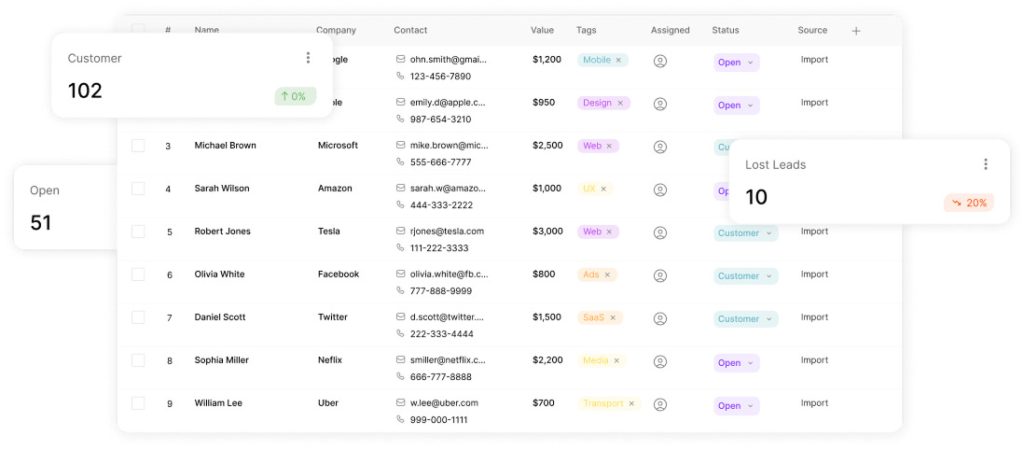
Effective customer relationship management begins with robust contact and lead management capabilities. This feature allows businesses to organize and track interactions with customers and potential leads, ensuring that no opportunity is missed. By centralizing customer data, businesses can provide personalized experiences and improve engagement. Furthermore, implementing effective lead management strategies for success enables businesses to prioritize high-value prospects and streamline their sales processes. By analyzing customer interactions and feedback, organizations can continuously refine their approach, fostering deeper connections and enhancing loyalty. Ultimately, a well-executed lead management strategy not only drives sales but also builds long-term relationships with customers. Additionally, integrating effective sales order management techniques allows businesses to efficiently process transactions and fulfill customer orders promptly. This ensures a seamless experience from lead generation to order completion, further enhancing customer satisfaction. By aligning sales and order management, companies can reduce errors and increase operational efficiency, leading to sustained growth and customer loyalty.
Sales Pipeline and Forecasting
A well-structured CRM system includes sales pipeline management and forecasting tools. These features enable businesses to track the progression of deals, identify potential bottlenecks, and predict revenue growth. Accurate forecasting helps businesses refine their strategies and make informed decisions. In addition to these benefits, a robust CRM system provides valuable insights into customer behavior and preferences, allowing for personalized interactions. By leveraging these insights, businesses can enhance their engagement strategies and build stronger relationships with clients. Ultimately, these capabilities empower organizations to manage your sales pipeline effectively, driving sustained growth and success in an increasingly competitive landscape. Moreover, adopting smart CRM solutions for sales leaders can significantly streamline the entire sales process, from lead generation to closing deals. These systems not only automate repetitive tasks but also provide actionable analytics, helping leaders make agile adjustments in real-time. By integrating advanced technology with customer insights, organizations can further elevate their competitive edge and adapt swiftly to market changes.
| Feature | Description | Benefit |
|---|---|---|
| Pipeline Analysis | View and analyze deal progression | Identify bottlenecks and areas for improvement |
| Accurate Forecasting | Predict deal volume and revenue growth | Refine business strategy and decision-making |
Marketing Automation Tools
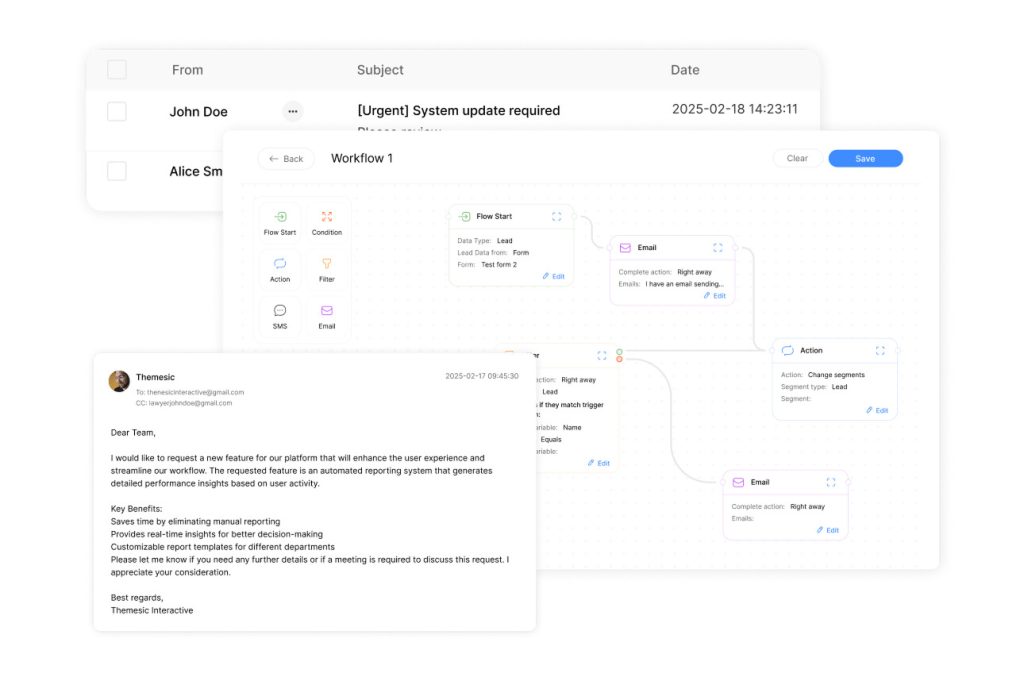
Marketing automation is a key feature of modern CRM systems, enabling businesses to streamline and optimize their marketing efforts. By automating routine tasks, businesses can focus on strategic initiatives and improve campaign effectiveness. This leads to better customer engagement and ultimately, increased conversions. Additionally, marketing automation often integrates seamlessly with sales force automation benefits, creating a cohesive approach that aligns marketing and sales teams. This synergy allows for a unified view of customer interactions, facilitating personalized communication and targeted campaigns. As a result, businesses can enhance their overall sales performance while maintaining strong relationships with their customers.
Reporting and Analytics Capabilities

Even a simple CRM needs robust reporting and analytics capabilities to provide valuable insights into business performance and customer behavior. Customizable dashboards, scheduled reports, and interactive data visualizations transform raw data into actionable business intelligence. This enables businesses to make informed decisions and drive growth.
- Comprehensive reporting capabilities provide insights into key performance indicators.
- Real-time analytics enable agile decision-making and strategy adjustments.
- Custom report builders allow users to create tailored analyses without technical expertise.
By leveraging these essential features, businesses can maximize the potential of their CRM system, driving improved customer relationships, enhanced sales performance, and ultimately, business growth.
How CRM Transforms Sales Processes
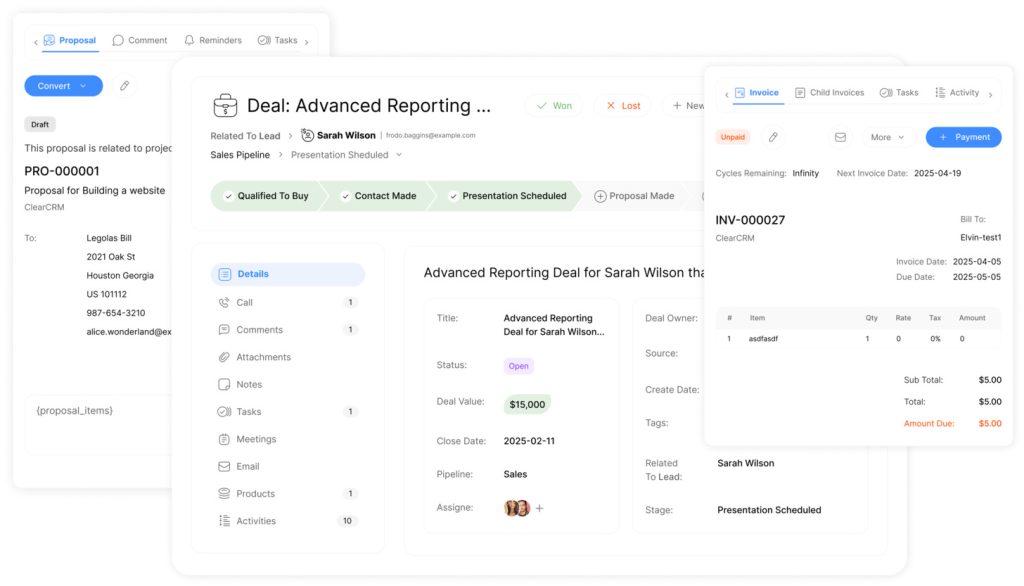
By leveraging CRM systems, businesses can significantly enhance their sales processes, leading to better customer experiences and increased productivity. CRM technology automates routine tasks, freeing up sales teams to focus on high-value activities. Additionally, integrating top sales software solutions allows for more effective tracking of customer interactions and sales metrics, empowering teams to make data-driven decisions. With these tools, businesses can not only streamline their workflows but also gain valuable insights into customer preferences and behaviors. This comprehensive approach ultimately drives sales growth and fosters lasting relationships with clients.
Streamlining the Sales Cycle
CRM systems dramatically improve the sales cycle by eliminating administrative burdens through automation of routine tasks like data entry, email follow-ups, and activity logging. This enables sales representatives to gain significant selling time when CRM tools automatically capture interaction details, generate meeting notes, and schedule follow-up activities without manual intervention. Moreover, CRM systems empower sales teams to visualize custom sales stages, allowing for a more tailored approach to customer engagement and pipeline management. This level of customization helps identify bottlenecks in the process and optimize strategies accordingly. Ultimately, the streamlined workflow leads to higher conversion rates and a more efficient sales process.
- Automated data entry reduces administrative tasks.
- CRM tools capture interaction details and generate meeting notes.
- Follow-up activities are scheduled automatically.
Improving Sales Team Productivity
CRM systems also enhance sales team productivity by providing team collaboration features that enable sales professionals to share best practices, successful pitch materials, and competitive insights. This creates a knowledge ecosystem that benefits the entire organization.
- Team collaboration features facilitate knowledge sharing.
- Performance tracking capabilities identify coaching opportunities.
- Territory management tools ensure balanced workload distribution.
By implementing a CRM system, businesses can transform their sales processes, making them more efficient and effective. This leads to improved customer satisfaction and increased sales productivity.
CRM for Customer Service Excellence
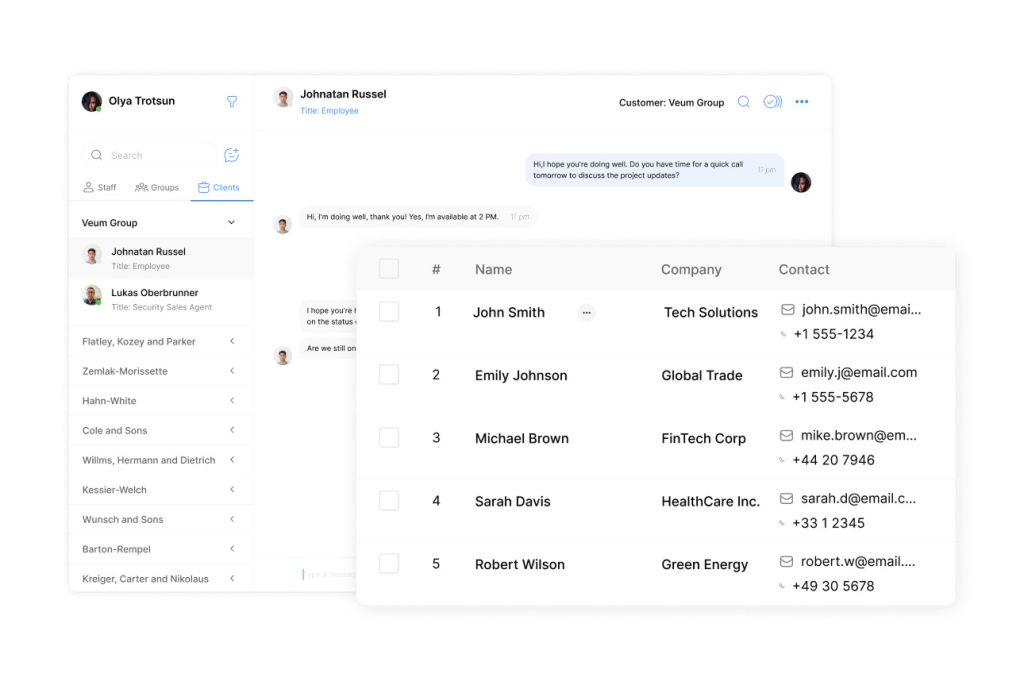
In today’s competitive business landscape, delivering exceptional customer service is paramount, and CRM solutions are key to this endeavor. By leveraging CRM systems, businesses can significantly enhance their customer service capabilities, leading to improved customer satisfaction and loyalty.
Creating a 360-Degree Customer View
A crucial aspect of excellent customer service is having a comprehensive understanding of each customer. CRM systems provide a 360-degree customer view by consolidating customer data from various touchpoints into a single platform. This enables customer service teams to access complete customer histories, preferences, and previous interactions, allowing for personalized and context-aware service from the first moment of contact.
With a unified customer view, businesses can ensure consistency across multiple channels, whether the customer is interacting via phone, email, or social media. This holistic approach to customer service empowers businesses to deliver seamless and efficient support, ultimately driving customer satisfaction and loyalty.
Enhancing Customer Support Interactions
CRM systems enhance customer support interactions by providing agents with immediate access to relevant customer information. Key features include:
- Case management capabilities that streamline support workflows by automatically routing issues to appropriate specialists and tracking resolution progress.
- Knowledge base integration that puts relevant troubleshooting information at agents’ fingertips, reducing resolution times and ensuring consistent responses.
- Service level agreement (SLA) tracking capabilities that help support teams prioritize issues based on urgency and contractual obligations.
- Post-interaction surveys and feedback collection tools that provide continuous improvement insights, helping businesses identify service gaps and recognize exceptional support experiences.
By implementing these features, businesses can significantly improve their customer support interactions, leading to enhanced customer satisfaction and loyalty.
Marketing Benefits of CRM Solutions
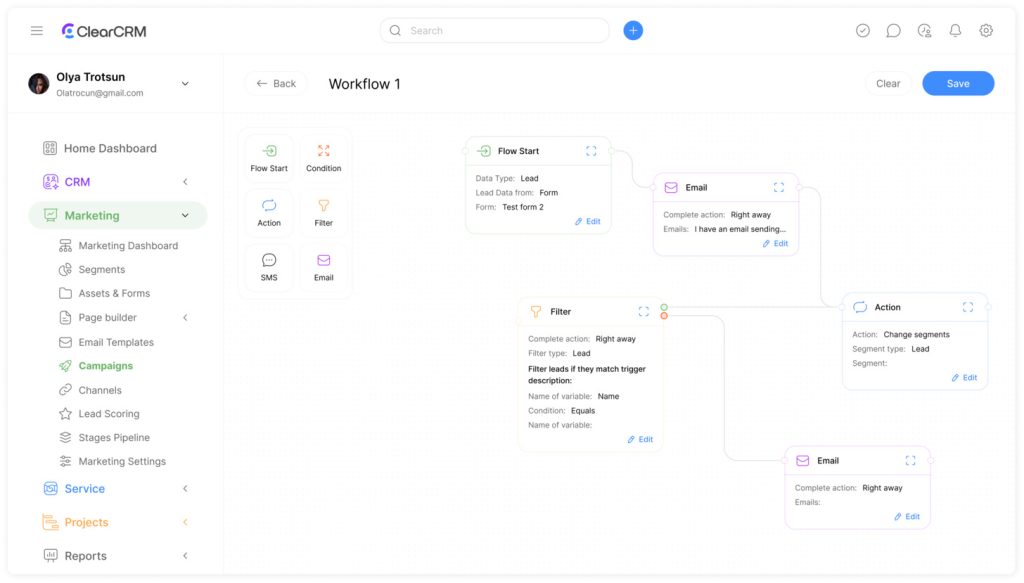
CRM solutions have revolutionized the way businesses approach marketing, enabling them to create highly targeted and effective campaigns. By leveraging the data and insights provided by CRM systems, businesses can significantly enhance their customer relationships and ultimately drive revenue growth. The marketing benefits of CRM solutions are multifaceted, enabling businesses to create targeted campaigns and enhance customer relationships. In this section, we’ll explore two key aspects: personalization and targeted campaigns, and customer segmentation strategies.
Personalization and Targeted Campaigns
Personalization is at the heart of modern marketing, and CRM systems are instrumental in making it possible. By analyzing customer data, businesses can create highly personalized marketing campaigns that resonate with their target audience. According to a study, personalized emails have a 29% higher open rate and a 41% higher click-through rate compared to generic emails. To learn more about how CRM can enhance your marketing efforts, visit ClearCRM for innovative CRM solutions.
Customer Segmentation Strategies
Effective customer segmentation is crucial for businesses to tailor their marketing approaches to different customer groups. CRM systems facilitate multi-dimensional segmentation based on various factors, including demographic, behavioral, and psychographic elements. Here are some key strategies:
- Divide the customer base into distinct groups sharing similar characteristics.
- Use CRM data to facilitate multi-dimensional segmentation.
- Implement dynamic segmentation capabilities to automatically update customer groupings.
- Utilize micro-segmentation for highly personalized marketing initiatives.
| Marketing Aspect | Traditional Marketing | CRM-Driven Marketing |
|---|---|---|
| Customer Segmentation | Basic demographic segmentation | Multi-dimensional segmentation (demographic, behavioral, psychographic) |
| Personalization | Limited personalization | Highly personalized campaigns |
| Campaign Targeting | Broad, less targeted | Highly targeted campaigns |
“The key to successful marketing is not just to reach your audience, but to resonate with them on a personal level.”
Popular CRM Software Options
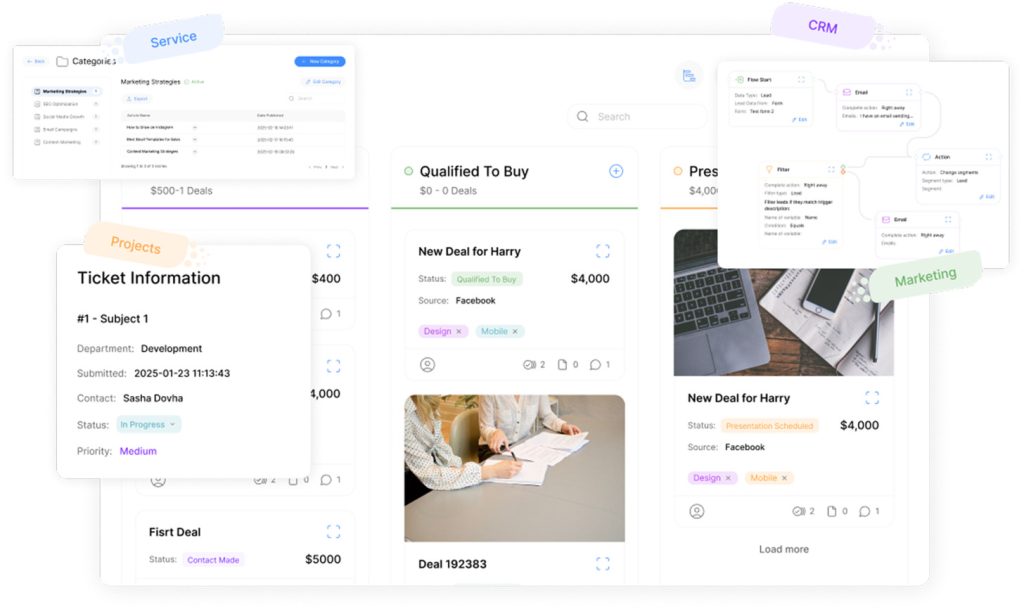
The right CRM software can significantly impact a business’s ability to understand and serve its customers better. With a variety of options available, businesses must consider their specific needs when selecting a CRM solution.
Solutions for Small Businesses
For small businesses, CRM software needs to be cost-effective, easy to implement, and scalable. These businesses benefit from solutions that offer streamlined sales processes, improved customer interaction tracking, and basic marketing automation. ClearCRM is an example of a CRM that enhances customer management for small businesses.
Enterprise-Level CRM Platforms
Enterprise-level CRM platforms deliver comprehensive functionality designed to support complex organizational structures and global operations. Key features include:
- Extensive customization capabilities to tailor the CRM to specific industry requirements and unique business workflows.
- Advanced security features, including role-based access controls and compliance certifications.
- Integration capabilities with ERP systems, business intelligence platforms, and custom applications.
Leading enterprise CRM providers include Salesforce, Microsoft Dynamics 365, SAP Customer Experience, and Oracle CX, each offering extensive ecosystems of complementary applications and specialized industry solutions.
By choosing the right CRM software, businesses can enhance their customer relationships, improve sales performance, and gain a competitive edge in the market. Whether you’re a small business or an enterprise, the key is to select a CRM that aligns with your business goals and customer needs.
Implementing CRM in Your Business

A well-planned CRM implementation is crucial for maximizing its benefits in your organization. To achieve this, businesses must consider several key factors that contribute to a successful rollout.
Planning Your CRM Strategy
Effective CRM adoption begins with a comprehensive strategy that aligns with your business objectives. This involves identifying your customer needs, defining your sales processes, and determining the key performance indicators (KPIs) that will measure the system’s success. By doing so, you can ensure that your CRM system is tailored to your sales team‘s needs, enhancing their productivity and efficiency.
Data Migration Considerations
When implementing a CRM system, data migration is a critical step that requires careful planning. This involves assessing the quality of your existing data, mapping it to the new system’s architecture, and executing the migration process. Ensuring data integrity during this transition is vital to avoid disruptions to your business operations and to maintain customer trust.
Training and Adoption Best Practices
To ensure successful CRM adoption, providing comprehensive training to your teams is essential. This includes tailoring the training program to different user roles, focusing on the specific features and workflows relevant to each department’s daily activities. Additionally, creating internal champions or “super users” within each department can provide accessible, peer-level support that accelerates adoption. By emphasizing the benefits of using CRM and celebrating quick wins, you can foster a culture that embraces the new system, leading to improved customer relationships and enhanced business outcomes.
Measuring CRM Success: Key Metrics and KPIs
The true measure of CRM success lies in its ability to enhance customer relationships, streamline sales processes, and drive business growth. To evaluate the effectiveness of a CRM system, businesses must analyze various metrics that reflect both sales productivity and customer satisfaction.
Sales Performance Indicators
Sales performance indicators are crucial in assessing the impact of CRM on sales processes. Key metrics include conversion rates, sales cycle length, and sales team productivity. By monitoring these indicators, businesses can identify areas where the CRM system is driving improvements and areas that require further optimization.
| Metric | Description | Impact on Sales |
|---|---|---|
| Conversion Rates | Percentage of leads converted into customers | Higher conversion rates indicate effective sales processes |
| Sales Cycle Length | Time taken to close a sale | Shorter sales cycles improve sales productivity |
| Sales Team Productivity | Number of deals closed per sales representative | Increased productivity reflects efficient CRM usage |
Customer Satisfaction Metrics
Customer satisfaction metrics provide valuable insights into how CRM implementation affects the client experience. Key indicators include Net Promoter Score (NPS), Customer Effort Score (CES), customer retention rates, and customer lifetime value.
- Net Promoter Score (NPS): Measures customer loyalty and advocacy by asking one simple question: “On a scale of 0-10, how likely are you to recommend our company/product/service to a friend or colleague?”
- Customer Effort Score (CES): Assesses the ease of doing business with your company, helping identify friction points in customer interactions.
- Customer Retention Rates: Reveal the long-term impact of ClearCRM strategies on maintaining valuable client relationships.
- Customer Lifetime Value (CLV): Calculates the overall economic relationship with customers over time, reflecting the effectiveness of ClearCRM-driven improvements.
By analyzing these metrics, businesses can refine their ClearCRM strategies to enhance customer satisfaction, improve sales performance, and drive long-term growth.
Common CRM Implementation Challenges and Solutions
Implementing a CRM system can be a complex process, often fraught with challenges that can hinder its effectiveness. Businesses must navigate these obstacles to ensure successful integration and maximize the benefits of their CRM investment.
Overcoming User Resistance
User resistance is a significant barrier to CRM adoption. To overcome this, businesses should focus on effective training and change management strategies. By engaging users early and providing comprehensive training, organizations can increase user adoption rates and reduce resistance.
Ensuring Data Quality and Integrity
High-quality customer data is crucial for the success of any CRM system. Ensuring data integrity involves implementing robust data governance policies, using automated data cleansing tools, and enforcing mandatory field requirements. Regular data quality assessments help maintain the accuracy and reliability of customer information.
| Challenge | Solution | Benefit |
|---|---|---|
| User Resistance | Effective Training and Change Management | Increased User Adoption |
| Data Quality Issues | Data Governance and Automated Cleansing | Improved Data Accuracy |
| System Integration | Robust Implementation Planning | Seamless Business Operations |
Conclusion: Getting Started with CRM
In today’s competitive business landscape, leveraging CRM solutions is crucial for driving sales, enhancing customer satisfaction, and streamlining operations. To get started, businesses should first establish clear objectives that define what success looks like, whether that’s increasing sales, improving customer retention, or enhancing service efficiency.
A thorough needs assessment is crucial to identify the specific CRM features and capabilities that will address unique business challenges and support strategic goals. When researching available CRM software and tools, factors such as ease of use, scalability, integration capabilities, and total cost of ownership should be evaluated to find the best fit.
Starting with a pilot implementation allows organizations to test the system with a limited user group, gather feedback, refine processes, and demonstrate value before rolling out to the entire company. Developing a long-term CRM roadmap ensures the initial implementation serves as a foundation for continued growth, with planned phases for adding advanced features and expanding user groups.
Many CRM providers, such as CRM automation platforms, offer free trials or demonstration environments, allowing businesses to experience the platform firsthand and gain valuable insights into how the system will work in their specific context, thereby providing crm help when needed.

